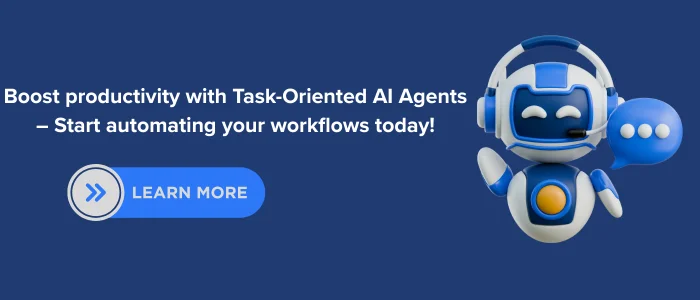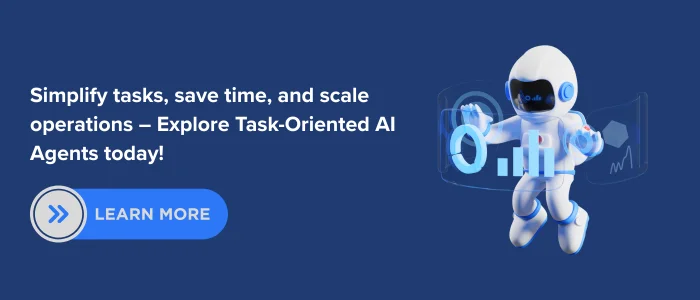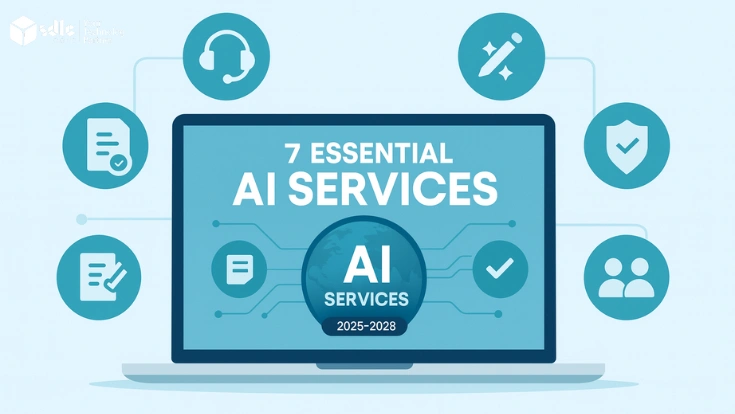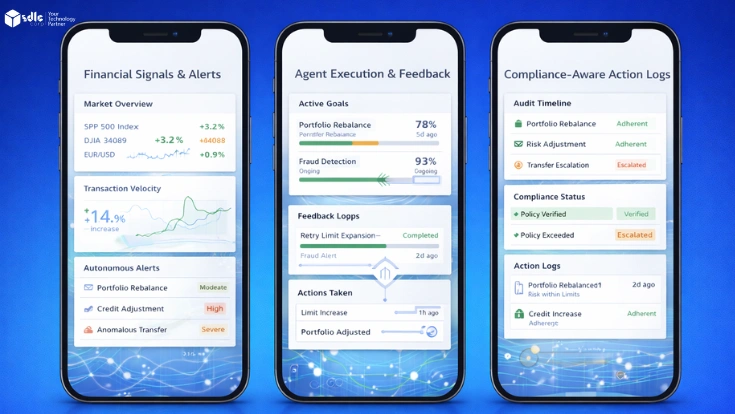Introduction
Artificial Intelligence (AI) is no longer a futuristic concept; it has become the backbone of digital transformation across industries. With the growing demand for AI development services, Task-Oriented AI Agents are rapidly emerging as a game-changer due to their ability to execute specific, goal-driven tasks with precision, efficiency, and autonomy. Unlike general-purpose AI models that handle broad problem-solving, these specialized agents are designed to streamline processes, boost productivity, and enhance customer engagement through structured workflows.
According to Gartner’s 2025 report, nearly 70% of businesses will implement task-oriented AI systems for customer support, workflow automation, and operational optimization. This marks a significant increase from 30% in 2022, underscoring the exponential demand for AI task automation and conversational AI for business processes.
What is a Task-Oriented AI Agent?
A Task-Oriented AI Agent is an intelligent software system designed to achieve specific, well-defined goals by interacting with users or systems through structured dialogue or automated workflows. Unlike open-domain conversational AI (such as chatbots that handle general queries), these agents focus on task execution, ensuring tasks are completed with precision.
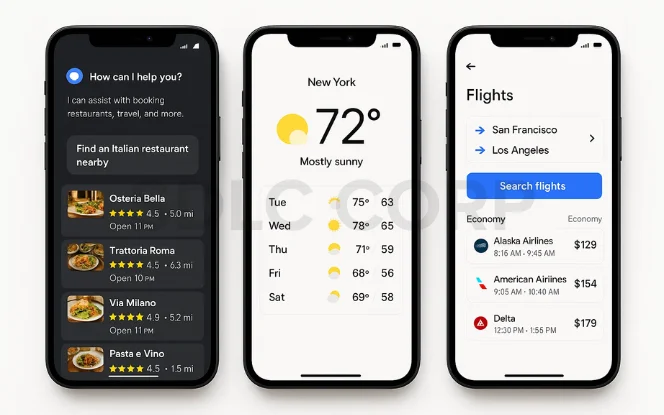
Some key characteristics of a Task-Oriented AI Agent include:
- Goal-Driven AI Agent: Prioritizes end objectives such as booking tickets, scheduling meetings, or processing orders.
- Intelligent Task Agent: Uses algorithms and natural language processing (NLP) to understand user inputs and deliver context-based results.
- Task-Based AI System: Integrates with enterprise tools and data sources to automate business workflows.
- Autonomous Task Agent: Requires minimal human intervention, handling repetitive and structured processes independently.
These agents are commonly built using structured AI pipelines supported by AI development services, where architecture, intent modeling, and system reliability are prioritized over open-ended conversation.
Why Businesses Need Task-Oriented AI Agents
Today’s businesses operate in an environment that demands speed, personalization, and accuracy. A recent McKinsey study found that companies integrating AI task automation can reduce operational costs by up to 40% while improving customer satisfaction scores by 35%.
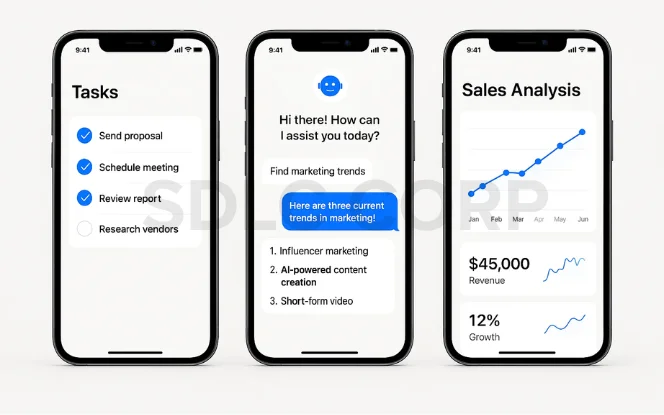
Here’s why organizations are adopting Task-Oriented AI Agents:
- Efficiency in Operations
By leveraging AI task execution, repetitive tasks such as data entry, appointment scheduling, and order tracking can be automated. - Improved Customer Engagement
Task-oriented chatbots act as AI assistants, offering personalized interactions while reducing wait times. - Error Reduction
Manual errors in processes such as billing or ticket booking are minimized when using a task-based AI system. - Scalability
Businesses can scale operations without increasing workforce dependency, making AI workflow automation cost-effective. - Enhanced Decision-Making
By analyzing structured and unstructured data, intelligent task agents provide insights that support faster, data-driven decisions.
Read More: Generative AI in Manufacturing Startups
Core Technologies Behind Task-Oriented AI Agents
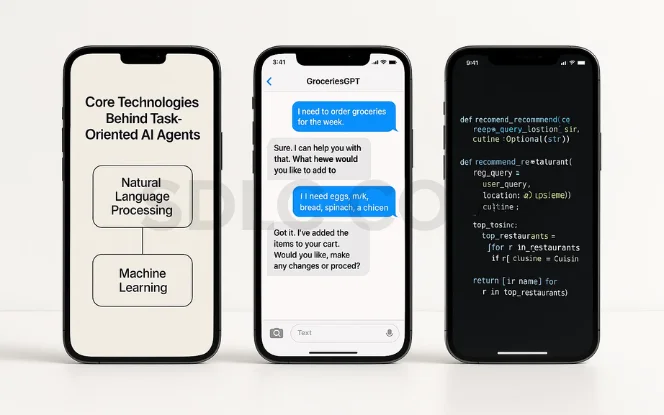
Task-oriented systems rely on several AI-driven technologies that enable efficient performance:
- Natural Language Processing (NLP): Powers natural language task agents to understand user intent.
- Machine Learning (ML): Allows the system to learn from previous interactions and improve accuracy.
- Conversational AI for Tasks: Enables fluid, human-like dialogue to achieve user objectives.
- AI Workflow Automation Tools: Integrate with CRMs, ERPs, and ticketing systems to complete complex tasks.
- Knowledge Graphs & Contextual Learning: Help agents recall context and respond appropriately.
Real-World Applications of Task-Oriented AI Agents
The potential of task-oriented dialogue systems extends across industries. Below are some powerful applications:
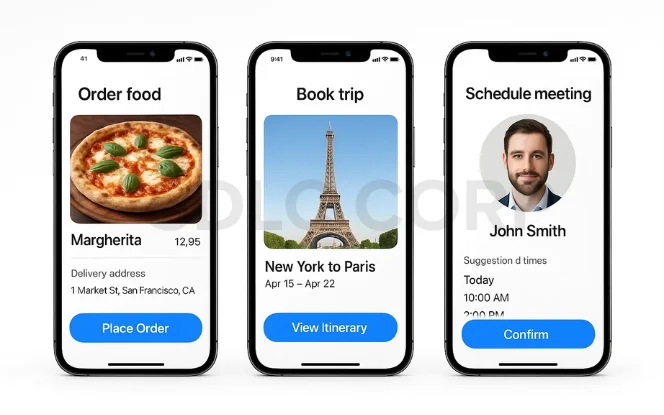
1. Retail Industry
Retail AI Agents guide customers through product searches, assist with order tracking, and provide return policies all while offering personalized recommendations. According to PwC, 65% of retail leaders report improved customer engagement after deploying AI assistants.
2. Healthcare
In healthcare, AI assistants help patients schedule appointments, check symptoms, and receive prescription reminders. A Statista report (2024) reveals that global AI healthcare chatbots are projected to reach $973 million by 2030, driven by task-based AI systems.
3. Banking and Finance
Autonomous task agents streamline loan applications, fraud detection, and financial planning. By automating these workflows, banks can reduce processing times by 50%, ensuring faster service delivery.
4. Education
Conversational AI for tasks assists students with course enrollments, exam schedules, and learning resources. This fosters AI-driven engagement and reduces administrative burden.
5. Travel and Hospitality
From booking flights to suggesting hotels, goal-driven AI agents handle complete travel journeys. Research shows that 85% of travelers prefer AI-driven booking systems due to their 24/7 availability and personalization.
Read More: Generative AI in Manufacturing Startups
6. Scaling Task-Oriented Agents Across Enterprises
In large organizations, agents must function consistently across departments and data systems. An enterprise AI development company can help design scalable frameworks with centralized governance.
Statistical Insights on Task-Oriented AI Agents
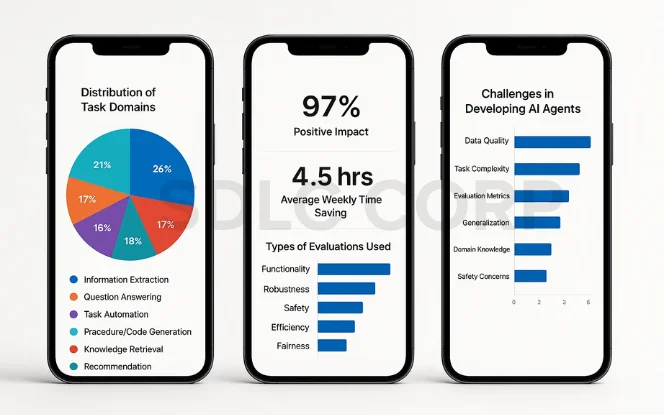
- MarketsandMarkets (2025) projects that the AI assistant and task automation market will grow from $5.2 billion in 2023 to $22.5 billion by 2028, at a CAGR of 34.7%.
- Deloitte’s 2024 AI survey shows that 42% of enterprises have already deployed task-oriented chatbots, with another 33% planning to adopt them by 2026.
- A Forrester report found that businesses leveraging AI workflow automation achieve 25% higher productivity gains compared to non-adopters.
Key Features of a Task-Oriented AI Agent
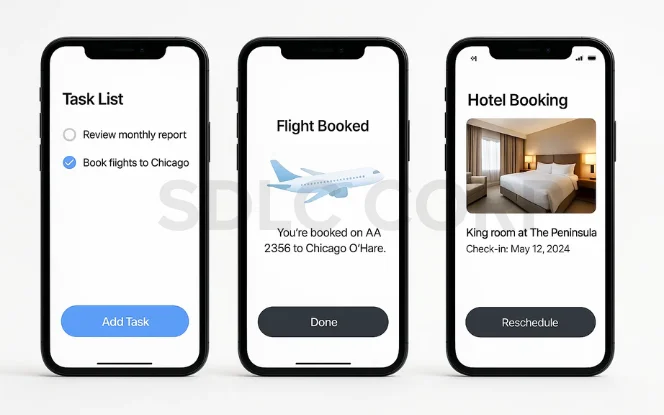
- Natural Language Understanding (NLU) – Powers natural language task agents to interpret human language accurately.
- Goal-Oriented Dialogue – Ensures conversations remain focused on achieving specific outcomes.
- Context Awareness – Remembers past interactions, improving engagement over time.
- Multi-Channel Integration – Works seamlessly across voice assistants, chat interfaces, and enterprise apps.
- AI Task Execution – Handles structured workflows like invoice processing, data validation, or onboarding.
Task-Oriented AI Agent vs General AI Chatbots
| Feature | General Chatbot | Task-Oriented AI Agent |
|---|---|---|
| Purpose | General conversation | Goal-driven task execution |
| Accuracy | Moderate | High |
| Context Retention | Limited | Strong |
| Industry Usage | Broad | Specific industries (retail, finance, healthcare) |
| Examples | FAQ bots | Virtual banking assistants, retail AI agents |
Read More: Generative AI for Supply Chain
Benefits of AI Workflow Automation with Task-Oriented Agents
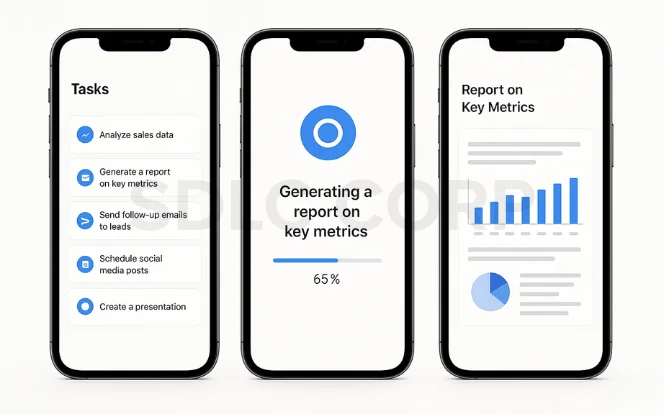
- Cost Savings: Automating processes can cut operational costs by 20–40%.
- Speed: AI task automation reduces turnaround times for customer service and back-office operations.
- 24/7 Availability: Ensures continuous service delivery.
- Employee Productivity: Staff can focus on strategic tasks instead of repetitive workloads.
- Customer Loyalty: Improved experiences lead to higher retention rates.
Future of Task-Oriented AI Agents
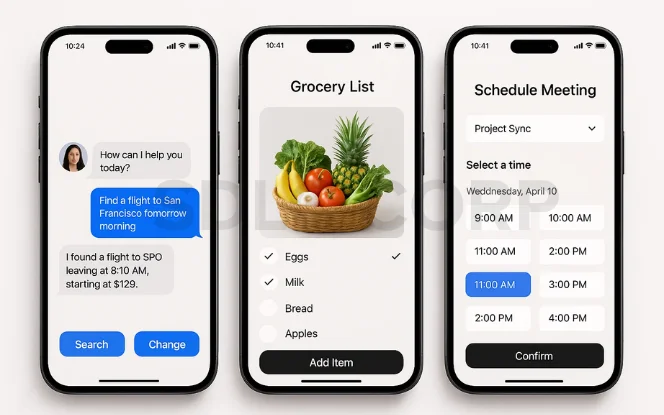
- Emotionally Intelligent Task Agents – Capable of understanding sentiment and tone for empathetic responses.
- Autonomous Decision-Making – AI task execution will become more independent, requiring minimal human input.
- Cross-Industry Integration – One intelligent task agent will handle tasks across industries, from banking to healthcare.
- Voice-First Task Agents – Growth in natural language task agents will make voice interactions the norm.
- Hyper-Personalization – AI will provide tailored recommendations by analyzing customer data in real time.
By 2030, experts predict that 80% of enterprise workflows will involve AI-driven task execution, making autonomous task agents central to digital transformation.
Governance, Oversight, and Risk Management
Task execution often affects real users or systems. An AI consulting company can assist in defining audit logs, approval workflows, and compliance controls for automated actions.
Conclusion
In today’s digital-first economy, Task-Oriented AI Agents are no longer optional they are essential for driving operational excellence. From AI workflow automation in enterprises to retail AI agents enhancing shopping experiences, these solutions are transforming industries by enabling goal-driven AI engagement.
With the growing adoption of AI as a Service, businesses deploying task-oriented dialogue systems are experiencing significant gains in efficiency, reduced costs, and enhanced customer loyalty. As AI continues to evolve, the future will be shaped by autonomous task agents capable of independently managing complex workflows with precision and scalability.
FAQ's
What is a Task-Oriented AI Agent?
A Task-Oriented AI Agent is designed to perform specific tasks like booking, scheduling, or customer support with high accuracy. Unlike general chatbots, it focuses on goal-driven execution. Businesses use it to improve efficiency and enhance user engagement.
How does AI Task Automation benefit businesses?
AI Task Automation streamlines repetitive processes such as data entry, ticketing, and report generation. By using an Intelligent Task Agent, organizations save time and reduce errors. This allows employees to focus on more strategic and creative responsibilities.
What is the difference between a Task-Oriented Chatbot and a General Chatbot?
A Task-Oriented Chatbot is built to achieve specific goals, such as order tracking or loan applications. It functions as a goal-driven AI agent with strong context retention. In contrast, general chatbots mainly handle FAQs without deep task execution capabilities.
How do Task-Based AI Systems improve workflows?
A Task-Based AI System integrates with enterprise tools like CRMs and ERPs to handle structured processes. With AI workflow automation, tasks such as invoicing, scheduling, or onboarding are completed seamlessly. This reduces delays and enhances productivity.
What is a Task-Oriented Dialogue System?
Conversational AI for Tasks enables natural interactions where users can simply ask, and the AI executes the request. By acting as a natural language task agent, it enhances customer satisfaction. Retail and service sectors use it to deliver personalized experiences.
What role does Conversational AI for Tasks play in customer engagement?
Conversational AI for Tasks enables natural interactions where users can simply ask, and the AI executes the request. By acting as a natural language task agent, it enhances customer satisfaction. Retail and service sectors use it to deliver personalized experiences.
What is an Autonomous Task Agent and how is it useful?
An Autonomous Task Agent can perform tasks with minimal human intervention. It combines AI task execution with workflow automation to handle complex operations independently. Industries like finance, healthcare, and retail use it for scalability and cost savings.

